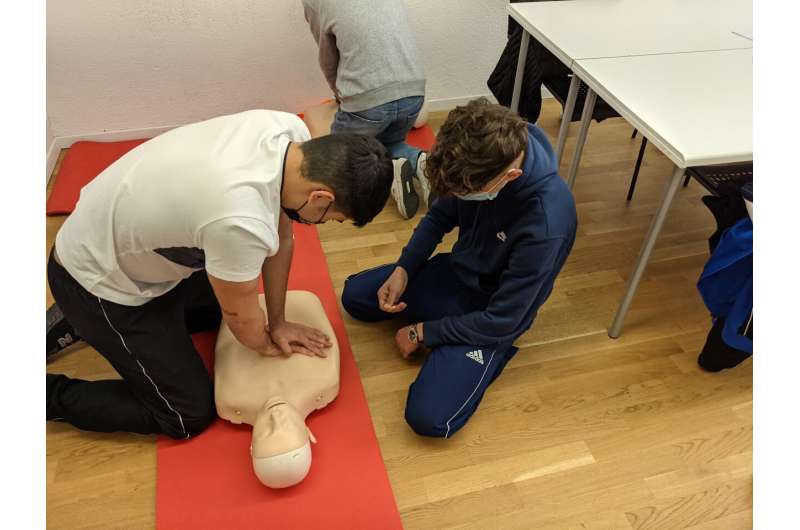This article has been reviewed according to Science X's editorial process and policies. Editors have highlighted the following attributes while ensuring the content's credibility:
fact-checked
peer-reviewed publication
trusted source
proofread
Asian adults in US less likely to survive cardiac arrest despite bystander CPR rate equal to that of white adults

Despite similar rates of bystander CPR after an out-of-hospital cardiac arrest, Asian adults in the U.S. have lower rates of survival than white adults, according to new research published today in the Journal of the American Heart Association.
In the study, believed to be the first research comparing bystander CPR and survival rates between Asian and white adults in the U.S., researchers reviewed data for nearly 279,000 out-of-hospital cardiac arrests. The analysis found:
- Asian and white adults who had a cardiac arrest at home or in public (not at a hospital) had similar rates (about 42%) of receiving potentially lifesaving CPR from a bystander.
- However, after adjustments for factors such as age, sex and the cause of the cardiac arrest, Asian adults were 8% less likely to survive to hospital discharge and 15% less likely to have favorable neurological outcomes compared to white adults.
"We were surprised that rates of bystander CPR in Asian adults were the same as white adults, as we have previously found that Black and Hispanic persons with out-of-hospital cardiac arrest have much lower rates of bystander CPR than white persons," said Paul Chan, M.D., senior author of the study and a professor of medicine at Saint Luke's Mid America Heart Institute and the University of Missouri-Kansas City. "The Asian community in the U.S. is economically and culturally diverse and not monolithic, and skin color of Asian persons also varies widely. Because of this, we had expected to see lower rates of bystander CPR in Asian versus white adults.
"Subsequently, since Asian individuals had similar rates of bystander CPR as white individuals, we didn't expect them to have lower survival rates. Receiving bystander CPR is usually a very strong predictor of survival after out-of-hospital cardiac arrest, therefore, it is not entirely clear what may be driving the lower survival rate among Asian adults," he said.
Cardiac arrest occurs when the heart malfunctions and abruptly stops beating. According to a 2023 Scientific Statement co-authored by the American Heart Association, out-of-hospital cardiac arrest is a leading cause of death worldwide, and bystander CPR rates varies between countries, averaging about 20% worldwide. In addition, global survival rates among all adults range between 2% to 20% and are particularly low without an immediate bystander response.
Study details and background:
- The study used data for 2013-2021 from the Cardiac Arrest Registry to Enhance Survival (CARES), a multicenter registry across the U.S. for out-of-hospital cardiac arrests, established by the U.S. Centers for Disease Control and Emory University in Atlanta.
- CARES data from other racial/ethnic groups, children and cardiac arrests that occurred in nursing homes or were witnessed by first responders were excluded from this analysis.
- CARES defines "Asian" as a person having origins in any of the original peoples of the Far East, Southeast Asia or the Indian subcontinent, including, for example, Cambodia, China, India, Japan, Korea, Malaysia, Pakistan, the Philippine Islands, Thailand and Vietnam.
- The research compared rates of bystander CPR, survival to discharge and favorable neurological survival (defined as survival to discharge without severe neurological impairment or disability) between Asian and white individuals.
- Among the cardiac arrest data analyzed, 5% occurred in Asian individuals and nearly 95% occurred in white adults.
- Asian adults with out-of-hospital cardiac arrest had several different markers in comparison to white peers: they were older (average age of 67 years compared to 62 years, respectively); more likely to be women (36% vs. 34%, respectively); less likely to have drug overdose as the cause of the cardiac arrest (1.3% vs.6.6%, respectively); and less likely to have an arrest rhythm that would benefit from the use of an automated external defibrillator (AED) (19% vs. 22%, respectively).
- Rates of witnessed cardiac arrest and location of arrest—at home or in public—were similar in both groups.
"It is quite encouraging that bystander CPR rates for Asian adults were comparable to white adults; however, the overall analysis indicates additional research is needed to better understand the gap in CPR survival and neurological outcomes among Asian adults after out-of-hospital cardiac arrest," said Joseph C. Wu, M.D., Ph.D., FAHA, volunteer president of the American Heart Association, director of the Stanford Cardiovascular Institute and the Simon H. Stertzer Professor of Medicine and Radiology at Stanford School of Medicine. "The results here call for us to investigate the biological and physiological factors, as well as socioeconomic determinants of health and outcomes, and how they may impact people in various Asian subgroups."
Among the study's limitations: the CARES registry did not include Asian subgroups, such as South Asian, East Asian and Southeast Asian, therefore, the findings are for Asian adults, in general as one group. In addition, the results may not be applicable to people living in rural U.S. regions because those communities are underrepresented in the CARES registry, and there was a lack of information about other health conditions in addition to cardiac arrest.
More information: Comparison of Out-of-Hospital Cardiac Arrest Outcomes Between Asian and White Individuals in the United States, Journal of the American Heart Association (2023). DOI: 10.1161/JAHA.123.030087


















